
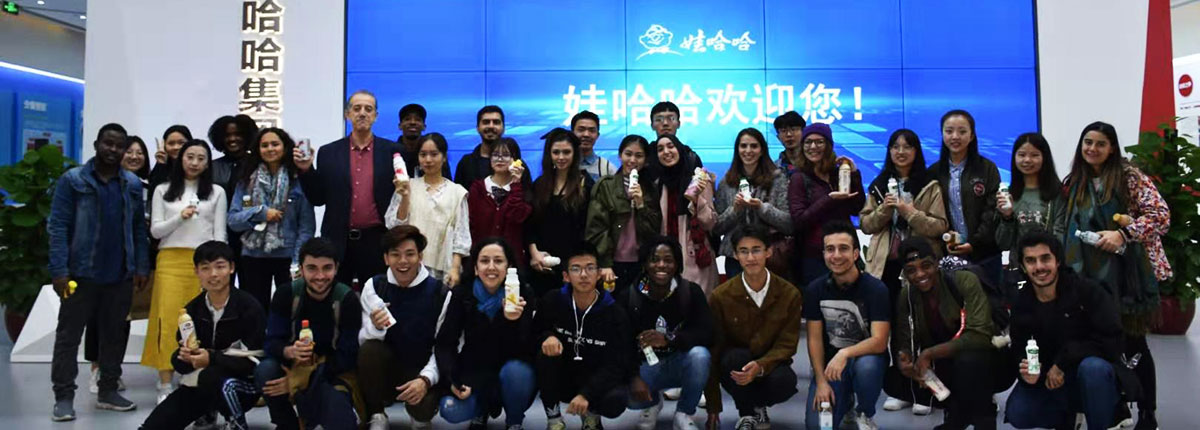

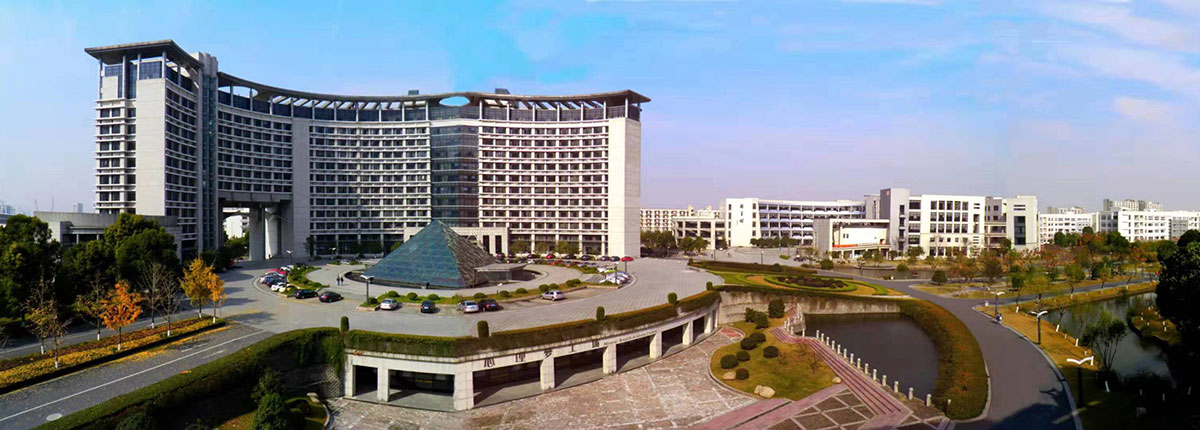
On November 5, the former Japanese Prime Minister Hatoyama Yukio paid a visit to ZJSU, with a meeting with Yu Jianxing, the Secretary of the Party Committee of ZJSU. On November 6, Hatoyama Yukio attended the ZJSU-hosted international symposium themed “Sino-Japanese Cultural Relations from the Perspective of East Asia: The Authenticity, Extension and Evolution of East Asian Art”, and delivered a keynote speech.
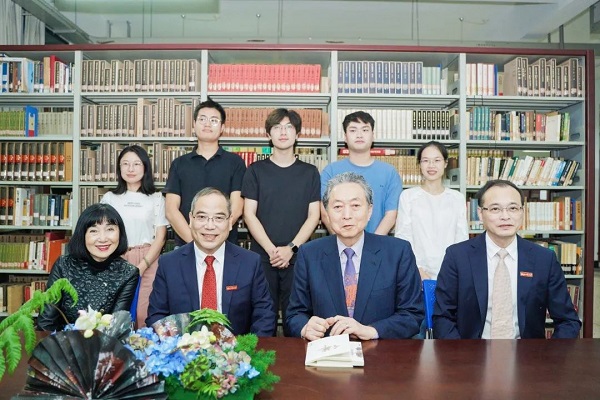
During the afternoon meeting on November 5, Hatoyama Yukio spoke highly of the extensive historical and cultural legacy of ZJSU, along with its remarkable accomplishments. He also extended his congratulations to the university for its successful organization of the handball competition at the Hangzhou Asian Games and commended the exceptional performance of the Chinese athletes in the event. Hatoyama acknowledged that it had been 3 years and 9 months since his previous visit to China and he eagerly seized this opportunity to convey his gratitude to the Chinese youth and students, expressing appreciation for China’s assistance and support to Japan during the pandemic.
“I feel all sorts of emotions to see you, my Chinese friends.”
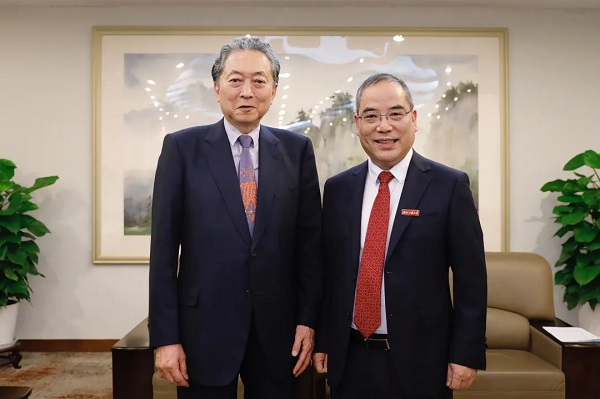
He mentioned that he has been actively organizing diverse Chinese language competitions and events in Japan to introduce Chinese language and culture to Japanese students. He expressed his optimism that ZJSU could assume a guiding and prominent position in enhancing cultural promotion and exchange between China and Japan, thereby fostering a more promising future for students from both nations.

Yu Jianxing warmly greeted the arrival of Hatoyama Yukio. He acknowledged the numerous heartwarming stories emerging from the Asian Games. Specifically, he highlighted the respectful and encouraging friendship between Chinese athlete Zhang Yufei and Japanese athlete Ikee Rikako during the swimming competition. This cross-national friendship among athletes exemplified the power of sportsmanship and the civil foundation of Sino-Japanese friendship. Yu emphasized that the foundation of friendship between the two countries lies within their people, and the prospect of a friendly future lies within the younger generation. Stressing the significance of peace, development, cooperation, and win-win outcomes for the global community, he introduced that “Benefactors are committed to benevolent acts”, which is the school-running philosophy of YingXian School of Philanthropy, the first national charity-based college in China, established two years ago at ZJSU. He expressed gratitude to Hatoyama Yukio for his unwavering efforts in promoting relations between China and Japan. When it came to the international landscape, Yu pointed out the notion of the “Thucydides Trap” proposed by Professor Graham T. Allison of Harvard University, considering it a fallacious concept by quoting President Xi Jinping, who stated, “There is no ‘Thucydides Trap’ in the world, but repeated strategic misjudgments between major powers can create such a trap.” Yu asserted that if major powers embrace the “amity” advocated by Mr. Hatoyama Yukio, Sino-Japanese and international relations will be different.
During the meeting, Yu Jianxing reviewed the cooperative experience with Japanese scholars. ZJSU has made a visible effort for long-term friendly exchanges since the establishment of the School of Oriental Languages and Philosophy in 2004. ZJSU has long stayed committed to China-Japan cooperation in higher education, offering innovative approaches to foster long-term friendly state-level relations. It has emerged as a prominent establishment for Japanese language education and research in China. He expresses anticipation that the visit of Mr. Hatoyama and the organization of the international symposium will further the progress of Japanese studies at ZJSU.
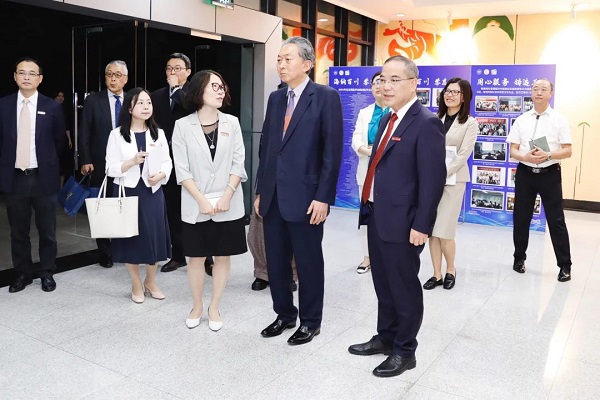
Following the conclusion of the meeting, the delegation led by Mr. Hatoyama paid a visit to the School of Oriental Languages and Philosophy. They were given a tour of an exhibition highlighting the accomplishments of the school and attended a subject report. On behalf of ZJSU, Yu Jianxing presented Mr. Hatoyama with the latest research findings from the school. At the Sino-Japanese Cultural Exchange Center, Mr. Hatoyama willingly inscribed his core political philosophy——“You Ai (amity)”.
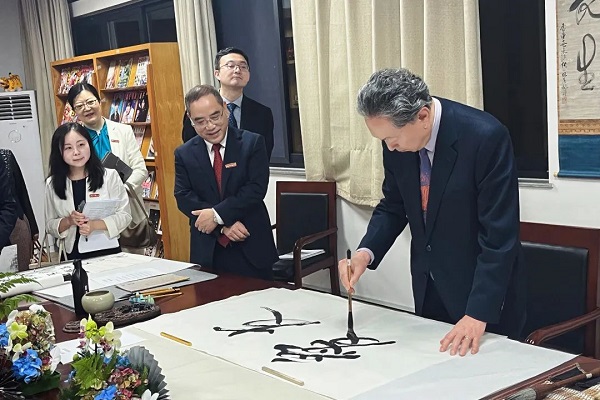
In the school library, Yao Jiacang, a dedicated senior student, warmly greeted Mr. Yujiro Hatoyama in fluent Japanese. Mr. Hatoyama praised Yao’s Japanese proficiency, stating, “Your Japanese is better than mine.” Witnessing Chinese students actively learning Japanese brought great joy to Mr. Hatoyama. He held the belief that young people could foster friendship and trust, and contribute to global peace and development by engaging in exchange activities with other countries through language and culture.

On November 6, Wang Yonggui, the president of ZJSU, met the delegation for a thorough exchange of views on further cooperation.
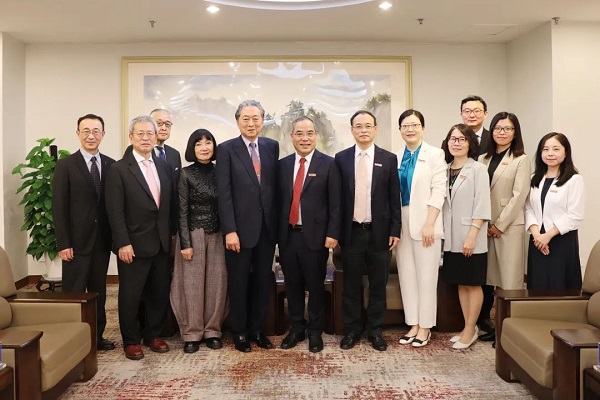
Wang emphasized the immense significance of Mr. Hatoyama Yukio’s presence at this symposium, with the approach of the 45th anniversary of the China-Japan Treaty of Peace and Friendship. The longstanding history of friendly exchanges between China and Japan has carried the rich artistic and cultural heritage of East Asian civilization, serving as a compelling testament to dialogue, mutual understanding, and the exchange of ideas. This not only plays an important demonstration effect and guiding role in building an East Asian community and a shared future for humanity but also strengthens the exchange and cooperation among the youth of both China and Japan. We hope that the youth of both countries will progress together in their endeavors.

ZJSU has dwelt long upon the research of China-Japan exchanges on trade, business, and culture, with its active effort to leverage its expertise to promote exchanges and interactions between Zhejiang Province, as well as China as a whole, with Japan. The Institute of East Asian Studies (IEAS) and the Center for Japanese Studies in ZJSU are recognized as some of the earliest established institutes in China specializing in Japanese studies.
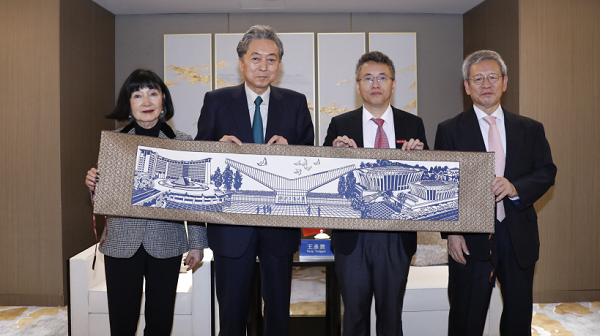
In his statement, Wang emphasized the unwavering dedication of ZJSU to East Asian studies and China-Japan cultural exchanges. The two institutes have now emerged as influential entities for East Asian and Japanese studies, significantly contributing to academic exchanges and people-to-people connections between the two nations. The symposium aims to explore the contemporary significance and future development of East Asian culture and tradition, taking an artistic and cultural approach. This event will offer valuable perspectives on cultural exchanges and people-to-people interactions between China and Japan.
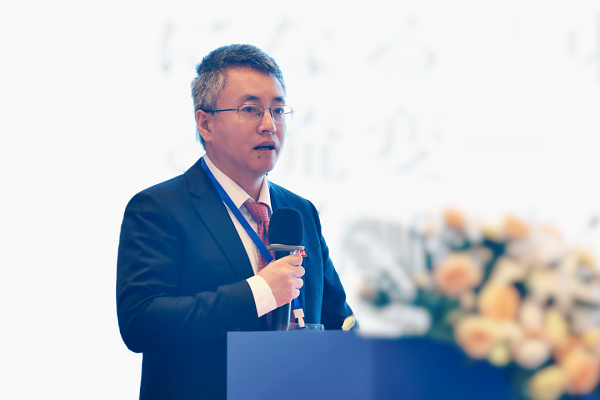
During the event, Hatoyama Yukio delivered a speech titled “Trends of the World and East Asian Community: A Community of Friendship and Shared Future”.
Amidst the current state of uncertainty in the world, Hatoyama Yukio expressed the view that international relations should be characterized by mutual respect among nations, in addition to self-respect. He referred to this approach as “amity”, highlighting the significance of not only engaging in cooperative relationships with countries that share similar values but also striving to coexist with nations that hold different values. He firmly believes in constructing an international society where countries with diverse values can coexist at a high level of mutual understanding, respect, and cooperation.
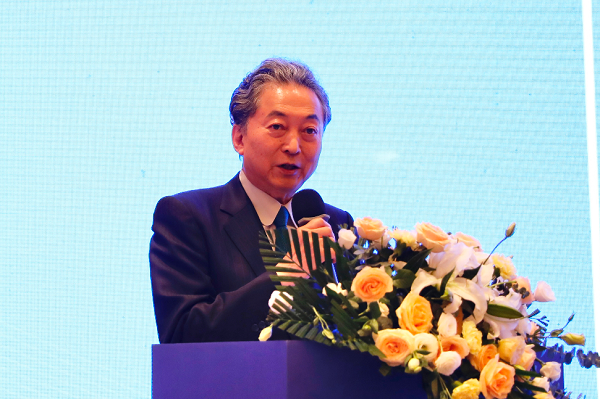
Hatoyama Yukio acknowledged that China, guided by the principles of “benevolence” and “forgiveness” rooted in its traditional culture, is pushing forward the establishment of a global community with a shared future that promotes world peace. He specifically highlighted China’s crucial role in normalizing relations between Saudi Arabia and Iran. “I highly value President Xi Jinping’s advocacy for a community with a shared future for humanity,” stated Yukio Hatoyama. He firmly believes that if China and Japan assume leadership roles in fostering the values of amity and forgiveness, the establishment of such a community is inevitable.
Hatoyama Yukio called for a society with amity, emphasizing that it can only be achieved through effective communication and collaboration among individuals from diverse nationalities, cultures, customs, and religious backgrounds. He extended an invitation to everyone in attendance, encouraging them to visit Japan, immerse themselves in the Japanese experience, and foster intimate connections with its people. He passionately urged everyone to join forces, while maintaining confidence in the future of China and Japan.